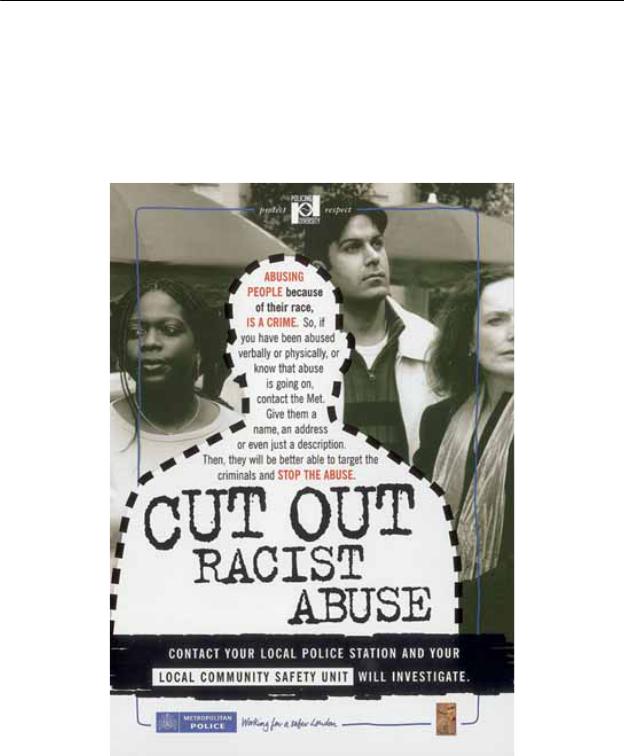
English fo MP student book
.pdf
UNIT 7 – Women: For Better and for Worse
Compare your ideas with your partner's. Look at the objectives below.
What organisation do they belong to?
Can you think of standards and processes you could employ to achieve the objectives?
•Exchange of knowledge, information and experiences within the European Police organisations;
•Stimulating international research and training in order to maximise the experiential learning for women police officers within Europe;
•Organising a Bi-annual European Conference;
•Organising specific seminars for both policewomen and -men to promote the exchange of good practice, information and learning;
•Stimulating and supporting the establishment of national networks of policewomen.
•A database to achieve centralisation of comprehensive information and enable efficient dissemination of the same.
Jokes?
A police graduate fresh from the Academy is on the beat. He sees a priest in the street. Without any warning he begins beating him. After a while, having beaten him severely, he says panting: “A Ninja, ha? So you think you’re a Ninja from the American movies, do you? That’s what I think of you, Ninja!!!”
What did the policeman say after coming out of a sewage canal he had fallen into? It’s a good thing the lid wasn’t on!’
Two policemen meet:
Hi, Ghitza!
Hi, Costica!
Can you tell me what ‘vacuum’ means?
Well, I have it in my brain, but I can’t explain it to you now.
GRAMMAR
Verb + full infinitive (with to) Verb + -ing
Verb + short infinitive (i.e. without to)
Some verbs are followed by a to infinitive, but they cannot take an – ing verb. Some examples are given in the box.
agree, aim, ask, decline, demand, fail, hesitate, hope, hurry, manage, offer, plan, prepare, refuse, want, wish.
Examples
1.The suspect agreed to accompany te police ofiicer to the station.
2.The prisoner demanded to see a lawyer immediately.
3.The police have managed to identify the suspects.
115

English for Modern Policing
Some verbs take the –ing form of the verb, but do not accept a to infinitive after them.
admit, avoid, consider, delay, deny, detest, dread, envisage, feel like, finish, imagine, recall, regret, resent, risk, suggest
Examples
4.The British police have sometimes considered carrying guns but many officers can't imagine having them as a matter of routine.
5.The defence counsel regretted calling the accused's brother as a character witness.
Some verbs are followed by a short infinitive after an object; there are also a few verbs, with idiomatic meaning, that require a short infinitive after them:
feel, hear, overhear, see, watch, have, let, make, hear, tell, make believe, let go
6.The surveillance officers overheard the suspects admit to have been in the building at the time.
7.The officers could only watch the kidnapper leave with his hostages.
# Exercise 3
REPHRASE using the correct form of the verb in capital letters and one of the patterns.
1. |
Maybe this is the hotel we are looking for. |
|
(APPEAR) |
|
2. |
They said they would like me to come with them on the trip. |
(INVITE) |
||
3. |
I’m sorry I haven’t seen the movie. |
|
(REGRET) |
|
4. |
The police believed he was the criminal because of the evidence. |
(LEAD) |
||
5. |
Does using the hotel sauna cost a lot? |
|
(PAY) |
|
6. |
Coming first in the race meant we could buy a new car. |
(ENABLE) |
||
7. |
It is compulsory for all students to be present at lectures. |
(REQUIRE) |
||
8. |
She might fail her driving test again. |
|
(RISK) |
|
9. |
Susy succeeded in finishing the assignment in time. |
(MANAGE) |
||
10. Calling Bob is pointless, because his phone is out of order |
(BE NO USE) |
|||
# Exercise 4 |
|
|
|
|
Choose the most appropriate answer(s) |
|
|
||
|
1. We needed … |
|
|
|
|
a) the car to be mended |
b) the car mending |
|
|
|
b) c) the car to be mending |
d) the car mended |
|
|
|
2. The teacher reminded ……… the papers. |
|
||
|
a) us where to leave |
b) us where we had to leave |
||
|
c) where we had to leave |
d) where to leave |
|
|
|
3. I’d advise …… more. |
|
|
|
|
a) |
to study |
b) you to study |
|
|
b) |
c) you studying |
d) your studying |
|
116

UNIT 7 – Women: For Better and for Worse
4. |
I remember …… the contest. |
|
|
|
|
||
a) |
he winning |
b) he to win |
c) him winning |
d) him to win |
|
||
5. |
The burglar confessed……. |
|
|
|
|
||
a) |
commit the crime |
b) to commit the crime |
|
||||
c) to have committed the crime |
d) |
committing |
|
||||
6. We persuaded……… a new car. |
|
|
|
||||
a) |
him to buy |
b) him buy |
c) him buying |
d) his buying |
|||
7. |
He ……… that he had caught the huge fish himself. |
|
|
||||
a) |
made us to believe |
b) makes us believe |
|
||||
b) |
c) made us believe |
d) made us believing |
|
||||
8. |
We waited for the taxi …… before saying goodbye. |
|
|
||||
a) |
coming |
b) to come |
c) come |
d) came |
|
||
9. |
They noticed …… away from school. |
|
|
|
|||
a) |
him to run |
b) him run |
c) him running |
d) him ran |
|||
117

UNIT 8
POLICING THE MULTICULTURAL SOCIETY
1.What do you understand by the notion “multicultural society”?
2.Do you regard your society as being multicultural and can you explain why?
3.Can you describe how at least one ethnic group in your society is culturally different?
Letting the Side Down
Read the text and comment on the implications.
Gary Younge, The Guardian, Monday December 17, 2001
At the Majestyk nightclub in Leeds city centre, neon lights cut through dry ice to reveal huge quantities of bare flesh. In two separate cages, suspended from the ceiling, women in white bikinis and huge snow boots writhe to the pulsating music then step aside for young men with torsos shimmering with baby oil to replace them. Down below, with the help of sweet, fizzy alcohol, the dating game is slowly evolving into the mating game. Young people with lust in their eyes and a drink in their hand are coming down with a ritual attack of Friday night fever. (1)
Outside, the bouncers stand with their backs to the main entrance looking over the city square. It is the ideal vantage point from which to retrace the flight of Sarfraz Najeib as he ran from his attackers. But these were no ordinary assailants. Among the accused were footballers Jonathan Woodgate, who has been found guilty of affray, and Lee Bowyer, who has been cleared of all charges. Though race was ruled out as a motive (2) in the retrial of Woodgate, Bowyer and two other men, the case came as a blow (3) to the football club, Leeds United, which has spent more than a decade struggling to shake off a reputation as one of the most racist in Britain.
The Asian student had been beaten to within an inch of his life (4) and the two were originally charged with racially aggravated assault. The players' fame would ensure national headlines; the race of their victim initially ensured national debate. The combination of the two would send both the city and the criminal justice system into denial.(5) The first trial collapsed in April, when the media also found itself in the dock. (6) While the jury was still deliberating, the Sunday Mirror published an interview with Najeib's father insisting that the attack was racist. The judge ruled it the "most serious form of contempt". (7)
When the trial restarted last month, the jury sat in a quite different world. Nearby Bradford had been scarred by some of the worst racial unrest since Brixton 20 years earlier. The events of September 11 added fuel to the fire and once again racial tensions were running high.
So while media attention this time has not been anywhere near as intense, the ramifications are still considerable. For in a one-team city which has spent much money and
118

UNIT 8 – Policing the Multicultural Society
energy reshaping its image, the repercussions will begin now the trial has ended. In the past, when club supporters have been involved in violence, the city council has been quick to distance itself. (8) This time it will not be possible.
Leeds United, despite having, in the 1960s, one of the first black players to play in the Football League, has always considered itself to be a whites-only club. But the reality of life in the city ran counter to that. More non-white immigrants settled, particularly in the Chapeltown area, and the wave of organised racism that spread through the country in the 1960s and 70s settled on the terraces of Elland Road, where the National Front recruited openly.
Nick Varley, a Leeds supporter and author of the authoritative Park Life, a Search for the Heart of Football, recalls hearing at his first match a call-and-response chant involving "hundreds, possibly thousands of fans", aimed at the one black player on the pitch.
"Trigger, trigger, trigger," called one side of the stand. "Shoot that f****** nigger," came the reply.
"Which f****** nigger?"
"That f****** nigger," was the answer, as the crowd pointed at the target of their venom.
"All around me were fans who joined in," writes Varley. "Not everyone, by any means, but a lot." By the late 70s, a white Leeds fan, Paul Thomas, had had enough of standing among what he felt was the silent majority. Along with friends and activists from the local trades council, he set up Leeds United Against Racism, in order to challenge the presence of fascists at the ground. "I thought either you tolerated the racism or you did something about it," he says. When they told police they intended to leaflet (9) the ground with an anti-racist message, the initial reaction was hostile. The police made it known through the press that they feared political violence would break out. The club considered suing the campaigners for unauthorised use of the club badge on the leaflets. But, says Thomas, the response from fans was encouraging. "Quite a few came up and congratulated us, saying stuff like: 'It's about time somebody did something about that lot.”
Under pressure from the council, which then owned the ground, club officials were persuaded to meet the demonstrators. Despite the choruses of hate ringing from its stands, the managing director refused to believe there was a problem and demanded proof. The anti-racists produced Terror on the Terraces, recording the abuse. "It's not as though we did any great undercover work," says Thomas. "We were just reporting what had already been reported."
Gradually, thanks to persistent activism, a change of management at the club and more pressure from the council, the atmosphere started to improve. There were statements condemning racist chanting from senior management and regular adverts in the programme against racism. The club developed its links with local black and Asian communities (it is presently working with Kosovan refugees). It also distributes anti-racist certificates to schools.
Racism has not been eliminated there, any more than it has anywhere else in the country, but it is no longer the dominant culture. Recently Thomas sat near a racist heckler and was backed by other fans when he asked him to stop. When the man threatened Thomas, he called the club's anti-racist hotline to complain. The club called him back quickly, asked detailed questions about the incident, and then called again to say the man's season ticket had been withdrawn.
Now, once again, Leeds United finds itself associated with allegations of racism, although this time very much against the run of play. Many Leeds fans - including committed anti-racists such as Thomas - believe racism was not a factor: "I think it tells you more about young men and alcohol than it does about race," he says.
119

English for Modern Policing
¾ Activity 1
Explain the meaning of the underlined words and phrases
Discuss with a partner the issue of racial abuse, football ‘culture’ and the roles of the police and the authorities.
Is this poster effective? Why?
The above poster is part of the Metropolitan Police (London) campaign to stop so-called “hate crime”. There are other posters in the series which can be seen at their web-site
www.met.police.uk
Read this text about the approach to multi-ethnic society policing in the Netherlands.
120

UNIT 8 – Policing the Multicultural Society
¾ Activity 2 |
"Keeping the Shop Open!" |
“Some years ago, it might still have been possible to wonder whether the multiethnic society was a reality. Nowadays, we would do better not to fool ourselves with such basic questions any longer, and to face the facts instead. Allow me to use a metaphor to illustrate our vision. In major European cities, there are probably still a number of small local shops, such as the greengrocer on the corner of the street in an old quarter of the city. There are shops like that in Rotterdam, too. The greengrocer has always sold traditional Dutch vegetables such as sprouts and cauliflower, which are displayed, fresh from the auction, in wooden boxes in front of the shop in the morning. But the population in these districts has changed and many residents of exotic origins prefer eggplants, olives and rice to traditional goods like cauliflowers and potatoes.
The greengrocer now has two options:
*he may either adjust the range of products he sells to the altered population of the neighborhood and stay in business;
*or he can keep on selling what he has always sold, and as a result he will have to close down his shop after a while.
The police are, in fact, in the exact same situation as this greengrocer. But there is one major difference: the police can never close down their shop: they will always be in business”.
(Eric van der Horst – Rotterdam – Rijnmond Police Department)
Discussion
What do you regard as your police service mission in “Policing a multicultural society”? With a partner, speak about the necessary changes, aims and objectives with reference to this dimension of policing.
# Exercise 1 Complete the text using the words in the box below:
enforcement, out, |
enforced, public, image, force, warden, |
|
|
uniform, |
probation, to observe, |
embodies |
|
Law must be ...... |
(1) if civilized man is to |
survive. Society cannot depend |
|
completely on simple persuasion to induce law observance, and therefore it must require
enforcement |
of |
law. The |
term ....... |
(2) implies, as does the |
very nature of man, the |
potential use of |
........(3) and this potential, then, is necessarily a part of the police role. But |
||||
the manner |
in |
which this |
potential |
is viewed by the public |
...... (4) often determines |
whether the police ..... (5) is good or bad. Because good police image tends, to affect favorably an individual’s willingness ........ (6) the law voluntarily, police retain a rightful interest in a good image. The law enforcement officer ..... (7) the law so visibly and directly that neither the policeman nor the public find it easy to differentiate between the law and its enforcement. Relatively few citizens recall ever having seen a judge, fewer still, a prosecutor, coroner, sheriff ........ (8) officer or prison .......(9). The patrolman is
121

English for Modern Policing
thoroughly familiar to all this ...... (10) picks him ....(11) from the crowd so distinctly that he becomes a living symbol of the law. Whether the police like it or not, they are forever marked men.
Read the text about a strategy developed by the Dutch police in order to meet the needs of a multicultural society.
A few years ago we came to the conclusion that was necessary to develop a police policy in our service that would address the issues of multi ethnicity and the consequences for our organization. We especially aimed at Turkish and Moroccan youngsters for several reasons. One of the reasons was that we already had police officers with another ethnic background coming from our former colonies. We have chosen an integrated approach.
Therefore this project was divided into four sub-projects:
1.recruitment and selection
2.inflow and career development
3.police training
4.prevention, conflict handling and combating discrimination
It was necessary to develop new methods and policies in these four fields.
In our regular recruitment campaigns we used national newspapers, radio and television guides for our advertisements. We also broadcast commercials. It became clear that we couldn’t reach certain ethnic communities through media. Therefore we had to look for other ways to get in contact with our target group. We contacted ethnic minority organisations and asked them for advice.
Another important part of the project concerned selection. We discovered that to a certain extend our selection process was culturally biased. As an answer to that problem we tried to develop so-called culturally sensitive tests:
BACON
BEARD
BEER
ADULTERY
Question: What does not belong in this series?
In this example, it is important to realise that you have to approach it from an Islamic reference in order to be able to answer the question.
We also learned that it is very important to involve colleagues from the “grass-roots” level in recruitment and selection. Colleagues were trained to do selection interviews. This way they have the idea that they are able to recruit their own future colleagues, and, by doing this, feel committed to the newcomers from a very early stage. More changes were needed to offer a friendly environment to these newcomers. A very simple example is the menu in the police restaurant. This also became more and more multicultural over the past few years.
Discussion
Do you think that it is necessary to recruit members of minority groups into all aspects of the justice system? Does this happen in Romania and in our police organization?
122

UNIT 8 – Policing the Multicultural Society
# Exercise 2 |
Select the correct answer (True or False) |
1.The police policy to be developed aims at Moroccan and Arabic youngsters.
2.They didn’t have, until now, police officers with another ethnic background.
3.One of the sub-projects is “inflow and career development”.
4.In the recruitment campaigns they used leaflets.
5.The selection process was culturally biased.
6.The selection interviews were done only by the police managers.
¾ Activity 3 |
Role Play |
Imagine that you have been assigned to do a selection interview with a 30-year-old man from an ethnic minority background. In pairs, prepare a set of questions and answers. Do not forget such aspects as family background, training, motivation, etc.
#Exercise 3 Choose a correct form of the passive to complete the sentences
1.The government recently stated that measures ......... (take) at both the administrative and legislative levels to guarantee the freedom of religion.
2.The authorities announced that the process of restitution of properties confiscated under the former regime...... (accelerate).
3.The new legislation....... (pass) in June 1997.
4.Allegations ....... (transmit) to the government in a number of cases related to issues of wrongful arrest, harrassment and ill treatment.
5.It..... (decide) by the authorities that, there is a need to create a multicultural perspective in the juvenile system.
6.The portrait of the wanted man .......... (issue) by the police.
7.The new strategy ........ (discuss) nowadays by the Ministry of Interior.
8.The anti-discrimination legislation....... (implement) by next year.
9.The fact that many Western European countries become multi-ethnic communities
........ (cause) by postwar migration.
#Exercise 4 Choose the most appropriate word underlined.
1.This neighbourhood is inhabited by / from Muslims.
2.The conflict area was immediately surrounded from / with police troops.
3.The shop windows have been smashed from / with rocks.
4.After the meeting the street was covered by / from leaflets.
5.A new training programme is included in / with the new legislation.
# Exercise 5 |
Put a suitable preposition in each space. |
1.The police officer was accused........ serious misconduct.
2.The murderer was sentenced ........20 years in prison by the Court.
3.The investigation showed that the accused has been involved ......breaking into the house.
4.Troops were called ...........when racist groups began gathering outside the downtown library.
5.The community was promised that the problem would be looked .....
6.The whole story told by the suspect in court was completely made ..........
7.Access to the basement level was blocked ..........by police and security guards.
123

English for Modern Policing
# Exercise 6 Match the description with the headings
POLICE AS A MIRROR OF SOCIETY.
CULTURAL ADDED VALUE
PROFESSIONALISING THE ORGANISATION
TRANSPARENT PROCEDURES
1.It is not only nice to know but there also is a need to know what is going on in society and anticipate those changes. No one is born with the necessary skills to provide full police services.
2.To establish their importance as a legitimate force in society, the police have a professional interest in reflecting the same ethnic diversity in their organisation.
3.Racial incidents reported to the police must be treated carefully. Victims must be heard and helped. Procedures should be transparent, especially for victims.
4.Learning from and respecting each other. It is obvious that you will only learn to overcome cultural differences if you meet and interact with other cultures.
#Exercise 7
Decide on appropriate collocations. (A + B) and (B +A)
A |
B |
behaviour, undercover, to take, statutory, to |
legislation, authority, minority, law, racist, |
enforce, racial, liaison, community, code, |
action, operation, officer, of practice, sexist, |
ethnic, protection |
ombudsman, incident |
|
|
Reading text 3
Briefing Paper for discussion on Muslim Delegation’s meeting with Home Office Minister, Ms. Angela Eagle.
Fault lines in Community Relations.
A delegation of Muslim community leaders met the Home Office Minister Ms. Angela Eagle this afternoon. The meeting was planned in order to raise with her their serious concerns over the dangerous fault lines that have shown up in recent weeks in community relations in Britain as manifested by the outbreak of disturbances in Northern England.
The most blatant example of rash and mindless police behaviour, if not, let us assume, an act of deliberate racism, was the senseless and brutal beating up of none other than the Labour Party National Executive Member Shahid Malik – and in front of the rolling TV cameras. Everyone watched Shahid Malik telling the police to hold back, “It’s OK”, he was saying to them after having restrained a group of angry youths behind him. He was instead pounced upon by the police and hit ferociously, thrown on the ground and handcuffed. This one incident did raise a few important questions the delegation told the minister.
124
